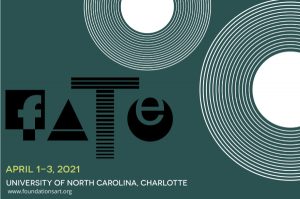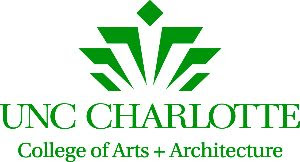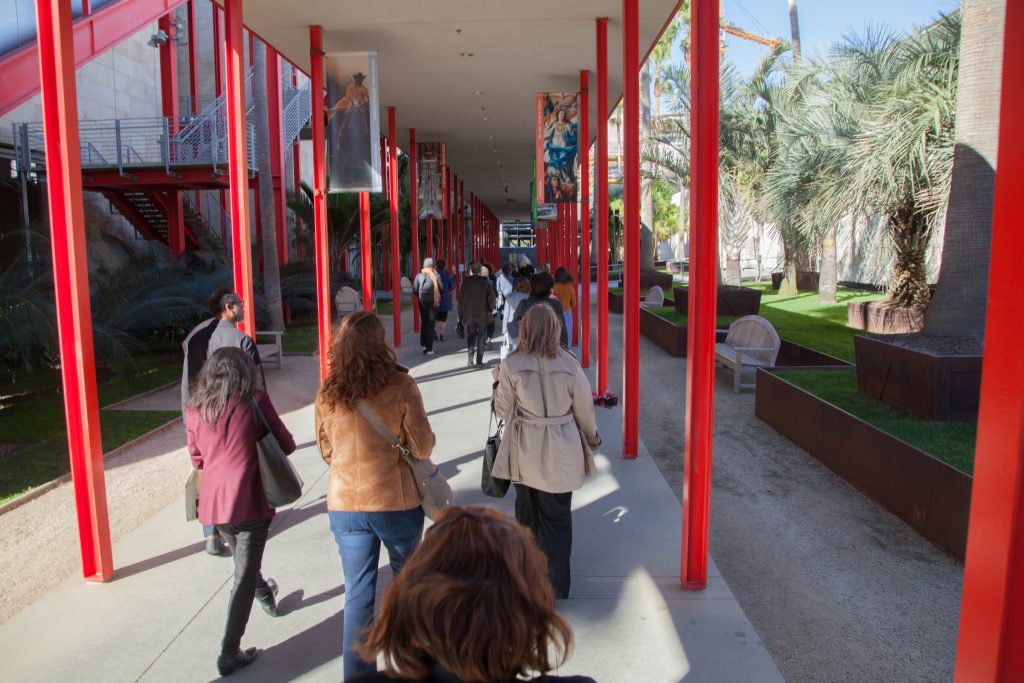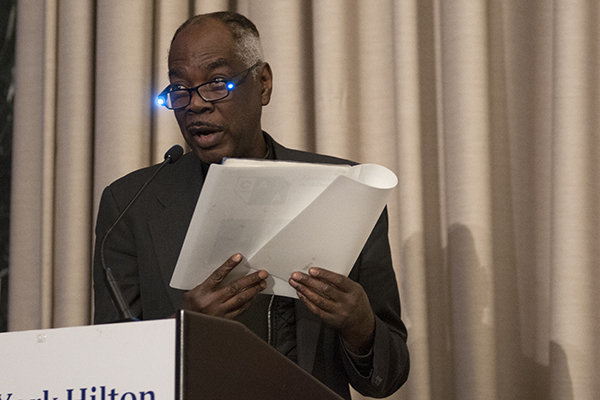CAA News Today
Meet the 2019 Wyeth Award Winners
posted by CAA — Nov 19, 2019
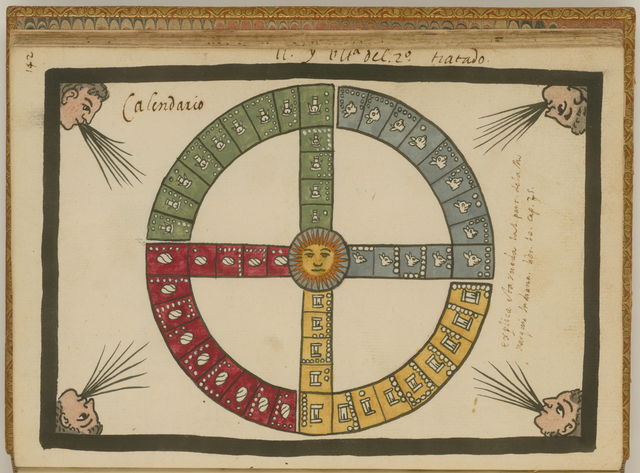
The Aztec Tonalpohualli Calendar, 1585, attributed to the 16th-century Mexican Jesuit Juan de Tovar. Image: Wikimedia Commons
Meet the Grantees
Since 2005, the Wyeth Foundation for American Art has supported the publication of books on American art through the Wyeth Foundation for American Art Publication Grant, administered by CAA. The 2019 grantees are:
- Lucy Bradnock, No More Masterpieces: Modern Art After Artaud, Yale University Press
- Elizabeth Ferrer, Critical Lens: A History of Latinx Photography, University of Washington Press
- Kimberly Beil, Good Pictures: A History of Popular Photography, Stanford University Press
- Elizabeth Boone, Descendants of Aztec Pictography: The Cultural Encyclopedias of Sixteenth Century Mexico, The University of Texas Press
Read a list of all recipients of the Wyeth Foundation for American Art Publication Grant from 2005 to the present.
BACKGROUND
For the Wyeth Foundation for American Art Publication Grant, “American art” is defined as art created in the United States, Canada, and Mexico. Eligible for the grant are book-length scholarly manuscripts in the history of American art, visual studies, and related subjects that have been accepted by a publisher on their merits but cannot be published in the most desirable form without a subsidy. The deadline for the receipt of applications is September 15 of each year.
Guidelines
Process, Materials, and Checklist
CONTACT
Questions? Please contact Cali Buckley, Grants and Special Programs Manager, at cbuckley@collegeart.org.
Meet the 2020 CAA-Getty International Program Participants
posted by CAA — Nov 14, 2019
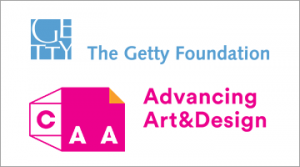
We’re pleased to announce this year’s participants in the CAA-Getty International Program. Now in its ninth year, this international program supported by the Getty Foundation will bring fifteen new participants and five alumni to the 2020 Annual Conference in Chicago, Illinois.
The participants—professors of art history, curators, and artists who teach art history—hail from countries throughout the world, expanding CAA’s growing international membership and contributing to an increasingly diverse community of scholars and ideas. This year we are adding participants from four countries not included previously—Bolivia, Saudi Arabia, Côte d’Ivoire, and Singapore—bringing the total number of countries represented by the program to fifty. Selected by a jury of CAA members from a highly competitive group of applicants, the participants will receive funding for travel expenses, hotel accommodations, conference registration, CAA membership, and per diems for out-of-pocket expenditures.
At a one-day preconference colloquium, to be held this year at the School of the Art Institute of Chicago, the fifteen new participants will discuss key issues in the international study of art history together with five CAA-Getty alumni and several CAA members from the United States, who also will serve as hosts throughout the conference. The preconference program will delve deeper into subjects discussed during last year’s program, including such topics as postcolonial and Eurocentric legacies, interdisciplinary and transnational methodologies, and the intersection of politics and art history.
This is the third year that the program includes five alumni, who provide an intellectual link between previous convenings of the international program and this year’s events. They also serve as liaisons between CAA and the growing community of CAA-Getty alumni. In addition to serving as moderators for the preconference colloquium, the five alumni will present a new Global Conversation during the 2020 conference titled Things Aren’t Always as they Seem: Art History and the Politics of Vision.
The goal of the CAA-Getty International Program is to increase international participation in the organization’s activities, thereby expanding international networks and the exchange of ideas both during and after the conference. CAA currently includes members from sixty countries around the world. We look forward to welcoming the following participants at the next Annual Conference in Chicago.
2020 Participants in the CAA-Getty International Program
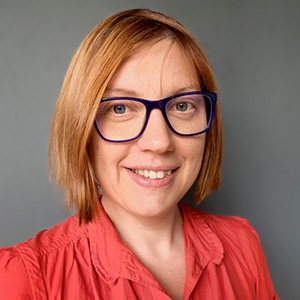
Irene Bronner is a senior lecturer with the South African Research Chair in South African Art History and Visual Culture, Faculty of Art, Design and Architecture, University of Johannesburg, South Africa. Her doctorate (DLitt et Phil), titled “Representations of Domestic Workers in Post-apartheid South African Art Practice,” was conferred by the University of Johannesburg in 2016. She then held a three-year postdoctoral research fellowship with the same institution, during which time she received a Postdoctoral Research Fellows’ Excellence Award. Her research interests center on feminist studies in the visual arts, with a focus on contemporary southern Africa. She works principally with feminist, queer and postcolonial cultural theory as well as issues of memory, affect, gender, and the aftermath of trauma. She has published in local and international journals, recently in Woman’s Art Journal and Textile: Journal of Cloth and Culture.
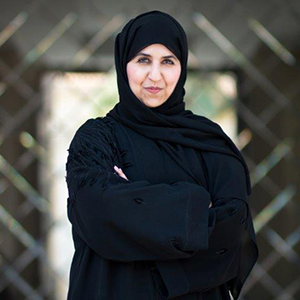
Eiman Elgibreen is an artist and an assistant professor of art history at the Princess Nourah bint Abdulrahman University in Riyadh, Saudi Arabia. She obtained a PhD in art history from the University of Sussex (UK) for her research on “Image Making: Representations of Women in the Art and Career of Safeya Binzagr 1968-2000.” Since 2011 Elgibreen has also been a freelance writer for Al-Riyadh Daily Newspaper and Al-Jazirah Daily Newspaper, and an art consultant for organizations that are concerned with preserving the legacy of Saudi pioneer artists such as Darat Safeya Binzagr (a museum devoted to the artist’s work), and Saudi Arts House (a family foundation devoted to the work of Mohammed Alsaleem). In addition, she has curated a number of art exhibitions, including the Saudi National Pavilion at the 58th Venice Biennale, 2019. Elgibreen is interested in exploring the forgotten and/or misrepresented aspects of Saudi and Arab culture through her research and her art. A goal of her work is to encourage acceptance of cultural differences.
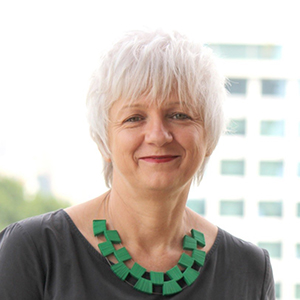
Dária G. Jaremtchuk is an associate professor of art history at the Universidade de São Paulo, Brazil, where she teaches undergraduate and graduate courses on contemporary art. As Fulbright Brazil Distinguished Chair at Emory University in 2019, she taught a course in the art history department about Brazilian contemporary visual arts. In 2018, she was a visiting scholar at Georgetown University and at Brown University in 2011. In 2010, she edited the book Arte e política: situações (Art and politics: situations) (Alameda Editora) and in 2007 she published Anna Bella Geiger: Passagens Conceituais (Anna Bella Geiger: conceptual passages) (C/Arte and Editora da Universidade de São Paulo). She is currently researching the relocation of Brazilian artists during the Brazilian military dictatorship of the 1960s and 70s and the artistic exchange between Brazil and the United States at that time. She has published on this topic in journals, conference proceedings, and book chapters.
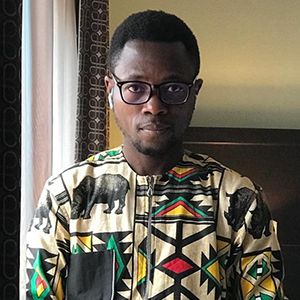
Ganiyu Jimoh received a PhD in art history from the University of Lagos, Nigeria, where he is also a lecturer. He is currently a postdoctoral fellow with the Arts of Africa and Global Souths research program in the Department of Fine Art at Rhodes University in South Africa. His research, which focuses on contemporary art, new media, satire, and cartoons has attracted major awards, including the prestigious University of Lagos Best Researcher Award in Arts and Humanities in 2011. In 2015 he received a grant to conduct research for his PhD dissertation at the African Studies Center at Michigan State University. Jimoh is also a recipient of the 2019 African Studies Association Presidential fellowship. As a scholarly writer who is also a practicing political cartoonist, Jimga (his cartoon signature) has several local and international exhibitions to his credit and currently serves as the secretary of Cartoonists Association of Nigeria (CARTAN).
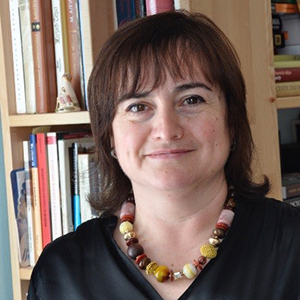
Mariana Levytska is a research associate in the Department of Art Studies of the Ethnology Institute at the National Academy of Sciences of Ukraine in Lviv. She received a PhD in the history of art from the Lviv National Academy of Arts in 2003. Based on her thesis, she published a monograph about Ukrainian portrait painting as an artistic and memorial phenomenon of the long nineteenth century. In addition, she has worked as a senior lecturer from 2005–14 and associate professor in 2015 at the Department of Architectural Environment Design in the Faculty of Architecture of the Lviv National Agricultural University. Levytska’s current area of research is Ukrainian religious art of the eighteenth century (late Baroque-Rococo period), focusing on the concept of cultural transfer according to “peripatetic works of art (such as engravings and albums)” as well as peripatetic artists. She is also interested in issues of Ukrainian historiography of the art of the twentieth century.
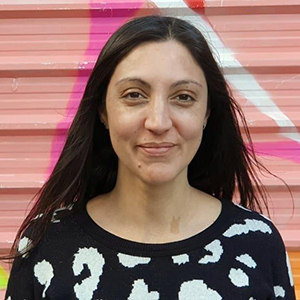
Daniela Lucena holds a PhD in social sciences from the University of Buenos Aires (UBA) and specialize in the sociology of art and culture. A researcher at the National Scientific and Technical Research Council (CONICET) in Buenos Aires, she teaches sociology of art courses at UBA, where she is also head of a research team. Since 2003 she has studied various aesthetical projects where art, culture, and politics are intertwined. Her books include Contaminación artística. Arte concreto, comunismo y peronismo en los años 40 (Artistic contamination: concret avant-garde, communism and Peronism in the 40s) (Biblios, 2015) and Modo mata moda. Arte, cuerpo y (micro)política en los 80 (Form kills fashion: art, body and [micro]politics in the 80s), coauthored with Gisela Laboureau, (EDULP, 2016). In addition to her work as researcher, since 2007 she has collaborated with PH15, a foundation that organizes photography workshops for children of vulnerable populations, assessing programs and community work linked to art.
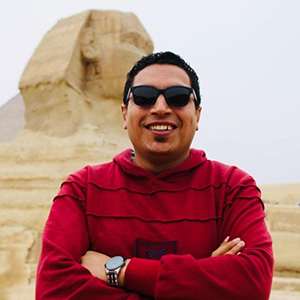
Ali Mahfouz is the director of the Mansoura Storage Museum, part of the Ministry of Egyptian Antiquities. He received a BA in 2010 and an MA in Egyptology in 2017, both from Mansoura University. He is currently working on his PhD. Mahfouz began working as an inspector of antiquities at the Ministry of Antiquities in 2012. In August 2015 he was appointed the supervisor of the Mansoura Storage Museum and in October 2018 he became its director. With colleagues, Mahfouz founded Save Mansoura, a volunteer organization dedicated to raising public awareness about the value of cultural heritage and the restoration of historic sites. He is also the cofounder of the Documentation of Architectural and Urban Heritage of Mansoura City Project, which aims to document, digitize, and archive that city’s cultural history. His greatest concern is the fate of archaeological sites damaged or destroyed because of political conflicts and the need to preserve his country’s cultural heritage in the wake of that destruction.

Priya Maholay-Jaradi is the founding convenor of a new art history academic program, a collaboration between the National University of Singapore (NUS) and the National Gallery Singapore. She earned an MA in art history from the School of Oriental and African Studies, London (2001); a PhD from NUS (2012), and a postdoctoral fellowship at the International Institute for Asian Studies, Leiden (2013). A former curator at the Asian Civilizations Museum, Singapore, she has curated Portrait of a Community (National Gallery of Modern Art, Mumbai, 2002), Beauty in Asia (Asian Civilizations Museum, Singapore, 2007) and Tautology of Memory (NUS Museum, Singapore, 2012). Jaradi’s monograph, Fashioning a National Art: Baroda’s Royal Collection and Institutions (1875-1924) (Oxford University Press, 2016), mobilizes provincial archives to reveal links between princely modernities and nationalisms in South Asia. She is the volume editor of Baroda: A Cosmopolitan Provenance in Transition (Marg Foundation, 2015). Her current research examines India-Singapore museological imaginations within the context of cold war diplomacy, the Non-Aligned Movement, and decolonization.
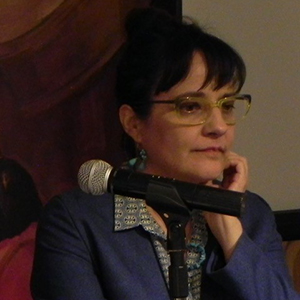
Valeria Paz Moscoso specializes in modern and contemporary Bolivian art history. She is the academic coordinator and advisor in the Department of Culture at the Universidad Católica Boliviana (La Paz), where she is also a temporary lecturer and editor of the journal Ciencia y Cultura (Science and culture). Her PhD dissertation examined the concept of repression and emancipation in the work of Bolivian artist Roberto Valcárcel. Currently, she is researching the disruption of the narrative of Indigenism in contemporary art. Additional research interests include gender, humor, critical theory, postcolonial studies, and arts-based research. She has curated exhibitions in Bolivia and the United Kingdom, and published in journals such as ESCALA Research Papers, Ciencia y Cultura, Bisagra (Hinge), Terremoto (Earthquake), and in the books Corrosión y Anomalía: escenas del arte contemporáneo boliviano (Corrosion and anomaly: scenes from contemporary Bolivian art) (2019) and Bolivia: Los caminos de la escultura (Bolivia: the paths of sculpture) (2009), a publication selected for the Bicentennial Library of Bolivia.
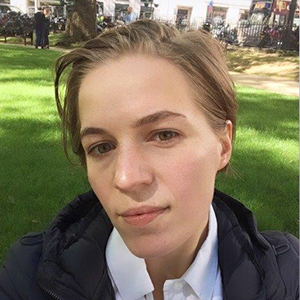
Daria Panaiotti is a photography curator and research associate in the Contemporary Art Department of the State Hermitage Museum, St. Petersburg, Russia. She graduated with honors from the European University in St. Petersburg (EUSPB), where she is currently completing her PhD with a dissertation on the history of Soviet documentary photography in Brezhnev’s era. She is also a member of the program committee of the After Post-Photography international conference, the only annual conference on photographic theory and history in Russia. Previously she was involved in the project In Support of Photography in Russia, funded by the IRIS Foundation, Moscow, where she was a member of the curatorial team that organized exhibitions of Russian photography for FotoFest 2012—an international photography festival held every two years in Houston, Texas—and where she also participated in an international portfolio review for Russian photographers at the Garage Center for Contemporary Culture in Moscow in 2011.
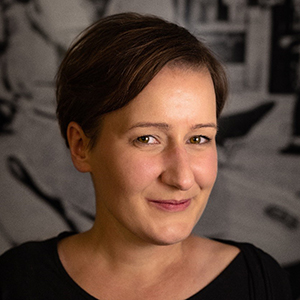
Aleksandra Paradowska is a lecturer and researcher in the Department of Art History and Philosophy, Faculty of Art Education and Curatorial Studies, at the University of Fine Arts in Poznań, Poland. After receiving a PhD from the Adam Mickiewicz University in Poznań in 2013, she was a postdoctoral fellow at the University of Wrocław from 2014–17. Her research focuses on architectural history of the nineteenth and twentieth centuries, especially the relationship between architecture and politics. For the past five years she has studied Nazi architecture in Polish territories during the Second World War in relation to different perspectives of the humanities, that is, interdisciplinary views of postcolonial and heritage studies. Paradowska has published widely on Polish interwar architecture and received several scholarships: from DAAD (Deutscher Akademischer Austauschdienst) in 2010, START by the Foundation for Polish Science in 2014, and a scholarship for leading young researchers in Poland by the Ministry of Science and Higher Education in 2017–19.
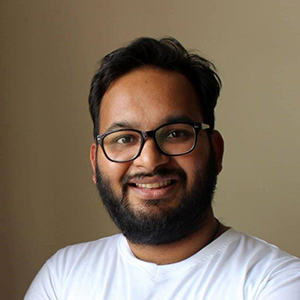
Saurabh Tewari received a BArch in 2008 from the Sushant School of Art and Architecture, Gurgaon/GGSIP University, Delhi (India), and a MDes in 2010 from the Industrial Design Center, Indian Institute of Technology Bombay. As a doctoral candidate in the Design Program at the Indian Institute of Technology Kanpur, he is attempting to map out and understand the shifting role of design in postcolonial India within the broader narrative of national development. Currently an assistant professor of design in the School of Planning and Architecture in Bhopal, Tewari has developed a curriculum that includes design history, design culture, and design studies. Ultimately, his goal is to develop South Asia’s first postgraduate program in design history and studies. He views his role in two ways: as a design historian in South Asia exploring and constructing scholarly approaches to design history, and as a South Asian scholar in the design history community voicing the potential of decolonized approaches to the field.
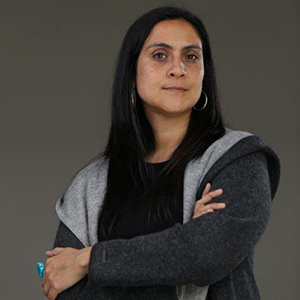
Giuliana Vidarte received a BA in Latin American literature and an MA in art history from the Pontificia Universidad Católica del Perú. In 2013 she was part of a curatorial intensive course in Northern Ireland organized by Independent Curators International (New York). In 2014 she received a travel grant to participate in the annual meeting of the International Committee for Museums and Collections of Modern Art (CIMAM) in Qatar. Between 2015–18, she was the curator of Bufeo: Amazonía+Arte, a project for the research and dissemination of Amazonian art. Vidarte has developed exhibition projects about the relationship between visual arts and literature, the rewriting of history based on the recovery of unofficial discourses, and artistic production in the Peruvian Amazon. Currently, she is chief curator and head of exhibitions at the Museo de Arte Contemporáneo in Lima (MAC Lima) and curatorial assistant for the Peruvian pavilion at the 58th Venice Biennale in 2019.
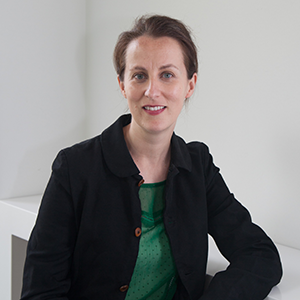
Julia Waite is the curator of New Zealand art at the Auckland Art Gallery Toi o Tāmaki, New Zealand’s largest art museum. She has worked on a number of large-scale exhibitions including the fifth Auckland triennial, If you were to live here . . . (2013) and Space to Dream: Recent Art from South America (2016). Her research interests are focused on the development of modern art in New Zealand and its connections with other peripheral modernisms. In 2015 she curated the exhibition Freedom and Structure: Cubism and New Zealand Art 1930–1960, which toured throughout New Zealand, and published an associated catalogue. She cocurated the major survey of New Zealand’s preeminent abstract painter Gordon Walters: New Vision, which opened at Auckland Art Gallery in 2018. Most recently, Waite has cocurated Louise Henderson: From Life, the first comprehensive retrospective of French-born New Zealand artist Louise Henderson. She has an MA in art history (First Class) and an MA in museum and heritage studies.
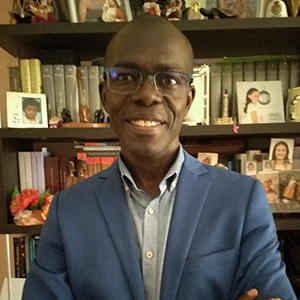
Jean-Arsène Yao received a PhD in Latin American history from the Universidad de Alcalá (Spain) in 2002. His scholarship focuses on teaching Spanish in the African Diaspora, particularly with blacks in Argentina. Currently professor of Latin America and Caribbean studies at the Université Félix Houphouët-Boigny (Côte d’Ivoire) and visiting professor at the Universidad de Alcalá and the Universidad de Granada (Spain), his teaching interests include Hispanic American culture and civilization; race, class, and ethnicity in Latin America; and Afro-Hispanic history. He has a special interest in the visual representation of people of African descent in art history and visual studies. Yao has conducted research in Argentina, Colombia, Cuba, Ecuador, and Uruguay. He has published widely, including five books, several book chapters, and over twenty articles in juried journals of research. Since 2016 he has been the founder-coordinator of the Group of Latin American Studies and Research (https://grelat-ufhb.org/).
Participating Alumni
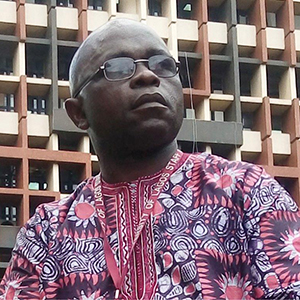
Abiodun Akande is a senior lecturer at the University of Lagos, Nigeria, where he teaches painting, art education, and art history. Akande earned a BA in fine arts from the Obafemi Awolowo University and received an MA and PhD in the visual arts of Africa from the Institute of African Studies, University of Ibadan, Nigeria. In 2013, he participated in the first Basel Summer School in African Studies at the University of Basel in Switzerland; he also attended a graduate symposium hosted by the School of Arts at Peking University in Beijing, China. Akande first participated in the CAA-Getty International Program in 2016 and returned the following year to participate in the 2017 CAA-Getty reunion program. His current research focuses on knowledge systems in the art and cultural practices of indigenous communities in Nigeria. A recent publication, “Ará òrun kìn-ìn kin-in: Òyó-Yòrùbá egúngún Masquerade in Communion and Maintenance of Ontological Balance,” (Genealogy, 3(1), 7, 2019) explores the Yòrùbá belief in life after death, and how the powers and spirits of the deceased are harnessed for the benefit of the living.
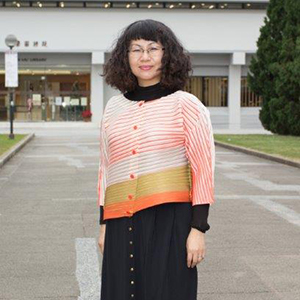
Pedith Chan is an assistant professor of Cultural Management in the Faculty of Arts at the Chinese University of Hong Kong. She received her PhD in Art and Archaeology from SOAS, University of London. Before joining the Chinese University of Hong Kong Chan was an assistant curator at the Hong Kong Museum of Art, and an assistant professor at the City University of Hong Kong. Her research interests focus on the production and consumption of art and cultural heritage in modern and contemporary China. Recent publications include The Making of a Modern Art World: Institutionalization and Legitimization of Guohua in Republican Shanghai (Leiden: Brill, 2017), “Representation of Chinese Civilization: Exhibiting Chinese Art in Republican China,” in The Future of Museum and Gallery Design (London: Routledge, 2018), and “In Search of the Southeast: Tourism, Nationalism, Scenic Landscape in Republican China,” (Twentieth-Century China, 2018). She is currently researching the making of scenic sites in modern China. Chan was a participant in the 2019 CAA-Getty International Program.
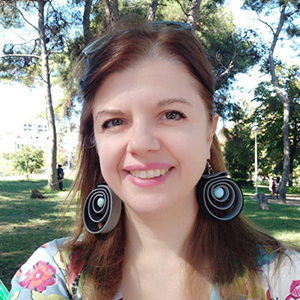
Iro Katsaridou has been the curator of modern and contemporary art at the Museum of Byzantine Culture in Thessaloniki, Greece since 2005. She studied art history at the Aristotle University of Thessaloniki and the Université Paris I-Sorbonne, and also pursued museum studies at the City University of New York. Her doctoral dissertation focused on contemporary Greek photography (Aristotle University, 2010). For the past six years Katsaridou has been researching photography and art in World War I and II, during which time she has curated exhibitions on the subject and edited related catalogues. For the last four years she has been teaching as an adjunct faculty member at several Greek universities. She has co-edited two books about photography during the Nazi Occupation of Greece (1941-1944) and written articles and book chapters on photography, exhibition display policies, as well as the relationship between contemporary Greek art and politics. In 2019, she participated in the CAA-Getty International Program.
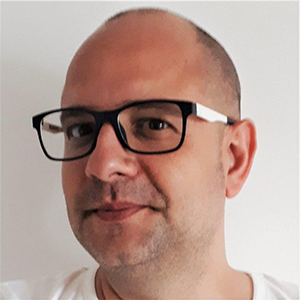
Cristian Nae is an associate professor at the George Enescu National University of Arts in Iași, Romania, where he teaches courses on contemporary art history, critical theory, visual and exhibition studies. He has benefited from scholarships and research grants from the Erste Foundation (Vienna), National Research Council, Romania (CNCS-UEFISCDI) , the CAA-Getty International Program, the Getty Foundation (Los Angeles), and New Europe College (Bucharest). His latest studies have appeared in collective volumes published by Wiley-Blackwell (2019, forthcoming) and Routledge (2018). Nae is the co-editor of Rethinking the Image of the World: Projects and Sketches. Contemporary Romanian Art 2010-2020 (Hatje Cantz, 2019, forthcoming). As a curator, he is the co-organizer of the exhibition Rethinking the Image of the World: Projects and Sketches (Musée Mill, La Louvrière, Belgium, 2019), which was part of the Europalia Arts Festival. Nae also curated Unfinished Conversations on the Weight of Absence, the exhibition marking Romania’s participation in the 58th Venice Biennale (2019). Nae participated in the first year of the CAA-Getty International Program, in 2012.
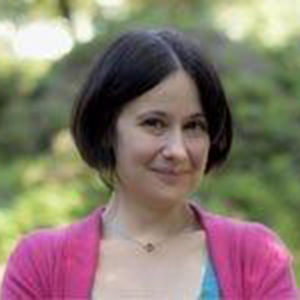
Nóra Veszprémi is a research associate for the European Research Council-funded project Continuity/Rupture: Art and Architecture in Central Europe 1918–1939 (CRAACE) at Masaryk University, Brno (Czech Republic). She is also an honorary research fellow at the University of Birmingham (UK), where she recently completed a project on museums in Austria-Hungary between 1867 and 1918. In 2014–15 she taught at the Institute of Art History at Eötvös Loránd University, Budapest (Hungary), where she also received her PhD in 2013. Veszprémi specializes in nineteenth- and early-twentieth-century Central European art. A former curator at the Hungarian National Gallery, she is the author of a monograph on romanticism and popular taste in mid-nineteenth century Hungary (in Hungarian) and co-author (with Matthew Rampley and Markian Prokopovych) of two forthcoming volumes on museums in Austria-Hungary: An Empire on Display: The Art Galleries and Museums of Austria-Hungary (Penn State University Press, 2020); and Liberalism, Nationalism and Design Reform in the Habsburg Empire: Museums of Design, Industry and the Applied Arts (Routledge, 2020). She is currently working on a monograph about historical memory in Central Europe after the collapse of the Habsburg Empire. Veszprémi was a 2015 participant in the CAA-Getty International Program.
Affiliated Society News for November 2019
posted by CAA — Nov 07, 2019
Affiliated Society News shares the new and exciting things CAA’s affiliated organizations are working on including activities, awards, publications, conferences, and exhibitions.
Interested in becoming an Affiliated Society? Learn more here.
Mid-America College Art Association
The Mid-America College Art Association is seeking to add a board member position to assist with financial aspects of the organization. The Association is an all-volunteer, national organization in the process of shaping a five-year plan (and beyond!) The Board meets once per month via ZOOM online meetings. If interested, please contact: Heather Hertel at heather.hertel@sru.edu.
American Society of Appraisers
Introduction to the Chinese Art Market, Challenges and Opportunities
Wednesday, February 5, 2019 | Webinar| 1:00pm – 3:00pm ET | $79 members; $119 non-members
In the past 20 years, the Chinese art market has grown dramatically, tracking the expansion of the Chinese economy, which is now the world’s second largest. This webinar will provide an overview of the socio-economic forces behind its dramatic growth and headline making prices at auction, and the challenges of appraising and advising on Chinese art. According to Artprice, since 2006, China has consistently been in the top three global art markets and is the largest in Asia. Some sectors are booming with prices often wildly exceeding auction high estimates, while others have stayed the same or declined. Drawing on more than twenty-five years in the field of Chinese art as an art historian, educator and appraiser, the presenter will address the following: the factors behind the growth of certain sectors, the role of mainland Chinese collectors and Chinese auction houses in driving the market, why the IRS will not accept realized sales from Chinese auction houses, the industry of fakes and forgeries of Chinese painting, sculpture, ceramics among other works of art and its impact on the market.
To see more upcoming ASA webinars and classes, click here.
William Morris Society in the United States
The William Morris Society in the United States is sponsoring two sessions at the Modern Language Association convention in Seattle on January 11 and 12, 2020.
Our first session, “Re-evaluating the Pre-Raphaelites,” examines how recent exhibitions have reassessed Pre-Raphaelite art and design, from William Holman Hunt and the Pre-Raphaelite Vision at the Manchester Art Gallery in 2009 to the traveling exhibition Victorian Radicals: From the Pre-Raphaelites to the Arts and Crafts Movement at venues through 2021. These displays have positioned the intersection of art, design, and literature as defining features of the Pre-Raphaelites and the Arts and Crafts movement, marking them as both “avant-garde” and deeply engaged with the past.
Our second session, “Ecosocialism and the Late Victorians,” is co-sponsored with the Association for the Study of Literature and Environment and addresses how the late nineteenth century saw artists and writers, including Morris, plant the seeds of ecological concerns in socialist politics, leading to innovative approaches to both environmental and socialist ideas.
Interested attendees who are not members of MLA may obtain guest passes by contacting kellyann.fitzpatrick@gmail.com
For paper abstracts, panelists, and scheduling information, see http://www.morrissociety.org/MLA2020sessions.pdf
Society of Architectural Historians
The Society of Architectural Historians (SAH) and University of Virginia Press are pleased to announce a new open-access, mobile-friendly edition of SAH Archipedia, an authoritative online encyclopedia of the built environment of the United States developed by SAH and Rotunda, the Press’s digital imprint, with lead funding from the National Endowment for the Humanities: sah-archipedia.org. The newly redesigned SAH Archipedia brings peer-reviewed scholarship to a worldwide audience of researchers, students, teachers, preservation advocates, cultural tourists and others interested in learning more about the architectural history of the U.S.
SAH will offer 36 paper sessions at its 2021 Annual International Conference in Montréal, Québec, Canada. The Society invites individuals and those representing SAH chapters and partner organizations to submit a session proposal for the Montréal conference. SAH membership is required to chair or present research at the annual conference; non-members who are selected to chair a session will be required to join SAH in August 2020. Session proposals covering every time period and all aspects of the built environment, including landscape and urban history, are encouraged. Session proposals are due January 14, 2020.
In a joint program with the Athenaeum of Philadelphia, SAH is pleased to offer the Charles E. Peterson Fellowship that will support the participation of a graduate student in the research and writing for a volume in the Buildings of the United States (BUS) series and/or SAH Archipedia. The recipient will research some aspect of American architecture prior to 1860, which they may choose from a list of topics provided by authors of forthcoming BUS books. The fellowship is intended for students currently enrolled in graduate programs in art or architectural history, architectural design, urban planning, historic preservation, landscape architecture, American studies, or related disciplines. The application deadline is January 6, 2020.
Historians of Islamic Art Association
CFP: Regime Change
University of Michigan
Ann Arbor
10.29–11.01.20
The aim of this conference is to focus on moments of “regime change” in Islamic art history and to also direct attention to “regimes” that structure our own field, raising questions of interpretation and method. We invite new research focusing on art and architecture after clear political ruptures (e.g., invasion, occupation, conversion); on the replacement of one symbolic order with another (e.g., public inscriptions in the urban space, changes in sartorial codes, new gender norms); and on the transfer of resources (e.g., artists, objects, libraries, treasuries) from one power to another. We also invite panels and papers that explore the potentials and pitfalls of new interpretive and methodological approaches to core questions about objects, material, and images, in both the academy and the museum.
Call for Papers
The submission deadline for pre-organized panels and single papers is December 1, 2019. For single papers, please submit as a single attachment a one-page CV and a paper abstract of no more than 250 words. For pre-organized panels (three or four papers), please submit as a single attachment one-page CVs for all speakers, and the panel abstract and individual abstracts, each no more than 250 words.
Please submit panels and papers to Christiane Gruber, Organizer (cjgruber@umich.edu). All other queries may be directed to Bihter Esener, Managing Organizer (besener@umich.edu).
Accepted speakers must be HIAA members in good standing by the time of the symposium. Speakers will have their travel expenses and accommodation covered by the University of Michigan and HIAA.
The 2020 HIAA Symposium Committee:
Christiane Gruber, organizer
Anneka Lenssen, Michael Chagnon, and Alain George, committee members
ACASA
ACASA Triennial 2020 Program Preview
ACASA 18th Triennial Symposium on African Art, June 17 – 21, 2020
The ACASA 18th Triennial Symposium on African Art will take place at DePaul University and the Art Institute of Chicago, June 17-21, 2020. This is the preliminary program:
Tuesday, June 16
Conference Registration, DePaul University Center
Wednesday, June 17
Museum Day and Reception, the Art Institute of Chicago. Separate registration required
Thursday-Sunday, June 18-21, 8am-5pm
Conference Panels, DePaul University Center
Thursday evening, June 18
Evening Reception at the Block Museum, Northwestern University
Friday evening, June 19
Awards Ceremony and Keynote Lecture by Koyo Kouoh, Executive Director and Chief Curator of Zeitz MOCA, the Art Institute of Chicago
Saturday, June 20, 5-9pm
Dinner and Dance Party, DePaul Student Center
For more and detailed information and registration, see:
ACASA website
Women’s Caucus for Art
Women’s Caucus for Art 2020 conference has a theme of Intersectionality
This conference, centered at Columbia College and concurrent with CAA, includes a wide range of panels and workshops.
The WCA 2020 President’s Award for Art and Activism will be given to Rose B. Simpson, a mixed-media artist, whose work addresses the emotional and existential impacts of living in the 21st century, an apocalyptic time for many analogue cultures. Her figures are often powerful matriarchs or elusively androgynous empaths who channel the spirits of high art, hiphop, lowrider attitudes, and long-lost ancestors of all kinds. Simpson’s work will also be discussed by Alicia Harris in the CAA panel on Inappropriate Bodies: Art, Design, and Maternity.
WCA has a new LGBTQIA+ Committee. Those interested in joining should contact the chair, Emily Getsay: getsay.emily@gmail.com
There are two national juried exhibitions on view during the conference, February 12-16: “Collectively Shifting,” Cecilia Vargas, juror, at Bridgeport Art Center and “Intersectional History,” Donna M. Weeks, juror at Woman Made Gallery.
American Institute for Conservation
We’re looking forward to our 2020 Annual Meeting in Salt Lake City! The theme is “Conservation – Reactive and Proactive.” Registration is now open! The full program schedule will be available shortly, so please continue to check our site for updated information.
Conservators play a vital role in protecting and preserving the objects and places that tell the story of our lives, history, and society. Become a Friend of Conservation and make sure our past has a future.
If you are interested in learning more about conservation and supporting the essential work performed by conservators, or want exclusive insights into conservation, including tips on preserving personal collections, learn about the benefits of being a Friend: www.culturalheritage.org/friends.
Historians of German, Scandinavian, and Central European Art and Architecture (HGSCEA)
HGSCEA is now accepting submissions for the Society’s 8th Annual Emerging Scholars Essay Prize, an award of $500 given annually to the author of a distinguished article or essay published the preceding year on any topic in the history of German, Scandinavian, or Central European art, architecture, design, or visual culture. Submissions, which must be in English and may be from electronic or print publications, must have a publication date of 2019. Applicants must be either current Ph.D. students or have earned a Ph.D. in or after 2015, and must be members of HGSCEAat the time of application. The deadline for submissions is 16 December 2019.
The Board is also seeking nominations and self-nominations for election to the HGSCEA Board for a three-year term to begin February 2020. Candidates for four at-large Board Members as well as for four Board Officers are all welcome. Each of HGSCEA’s three areas – Germany, Scandinavia, and Central Europe – should have at least one representative on the Board and candidates from all three of these areas are currently sought. Any member of HGSCEA in good standing may seek election to the Board. The deadline for nominations is 25 November 2019.
For more information on how to join HGSCEA, on the responsibilities of Board members, and how to submit materials either for the publication prize or for the election, please go to the HGSCEA website: http://hgscea.org/
Renaissance Society of America
RSA Travel, Diversity, and On-Site Care Grants
The Renaissance Society of America will hold its Annual Meeting in Philadelphia April 2-4, 2020. RSA members are invited to apply for travel, diversity, and on-site care grants. Each grant has a separate application with different requirements. Applications for conference grants are now live and can be found here. The deadline for all grant applications is December 3, 2019. Haven’t registered for the conference yet? Here is the link.
Day of Digital Learning
The RSA is pleased to offer a Day of Digital Learning on Sunday, 5 April 2020, the day after our Annual Meeting in Philadelphia (April 2-4, 2020). A tentative course list is now available to view. Signup will begin in January.
Innovative Teaching Grant Winners Announced
The RSA is pleased to announce our Grants in Support of Innovative Teaching of Renaissance Studies to High School Students will fund two projects this year. One examines the historiography of Spanish Arizona and the other highlights an inclusive Shakespeare curriculum. RSA President Clare Carroll announces our winners.
Renaissance Quarterly Open Access
The Editors of Renaissance Quarterly are pleased to provide complimentary access to two collections of articles from the journal, one relating to Islam and the Middle East and the other on The Americas.
SOCIETY OF HISTORIANS OF EASTERN EUROPEAN, EURASIAN, AND RUSSIAN ART AND ARCHITECTURE (SHERA)
The Board of the Society of Historians of Eastern European, Eurasian, and Russian Art and Architecture (SHERA) is pleased to announce that Anna (Ania) Paluch of Carleton University has been awarded the SHERA Graduate Student or Independent Scholar Travel Grant to attend and present at the 108th CAA Annual Conference in 2020. She will be delivering a paper entitled “From Turtle Island to Vistula’s Shores: Indigenous and Slavic Futurisms in Dialogue” as part of the panel “The Present of the Future: Indigenous Futurisms in the Visual Arts” (Saturday, February 15, 2:00 – 3:30 PM in Continental B, Lobby Level). Paluch examines “the use of oral stories, memories, history, and cultural survivance within pop culture, contact zones, Native and Slavic Slipstreams and oral stories/legends as sci-fi (SF) narratives within Indigenous Futurism and Slavic Futurism, and how these genres are connected through those concepts.”
The SHERA-sponsored panel “Freezes and Thaws in the Socialist Bloc” will be held on Saturday, 4:00 – 5:30 PM in the Astoria Room (3rd Floor). This session will consider art from the former Soviet Bloc and beyond that tried to recuperate, revivify, or re-engage cultural formations that had previously been rejected or suppressed. Papers include: “A Classic(al) Russian Freeze: Timur Novikov and the New Academy of Fine Arts” (Liana Battsaligova, Yale University); “Jugoslovenka and her Discontents: Feminist Resistance During Yugoslav Socialism & After” (Jasmina Tumbas, University at Buffalo); and, “Neo-avantgarde on repeat: Polish contemporary artists revisit the 1970s” (Magdalena Moskalewicz, School of the Art Institute of Chicago).
Association of Greek Art Historians (EEIT)
The 6th National Conference the Association of Greek Art Historians (EEIT) will be held November 22 through 24, 2019 at the Amphitheater of the Benaki Museum, 138 Pireos Street, Athens, Greece. Thirty eight papers will respond to the conference’s theme, “Periods of Crisis and Paradigm Shifts,” and will address the following topics: canonical narratives and their relative ‘paradigms’; paradigm shifts and epistemological ruptures; interdisciplinary approaches, technoscience and the crisis of humanist studies; and global art history, interculturality and art geographies. A keynote address by Mechthild Fend, professor of history of art, University College London, will investigate the theme of medical pathology in relation to the crises of the French Revolution.
More information is available at: https://eeit.org/news/6th-conference-of-history-of-art/?lang=en
Association of Art Museum Curators
Know a curator who is creating groundbreaking new work?
Nominate them for Association of Art Museum Curators’ Awards for Excellence, the annual prize dedicated to recognizing both affiliated and independent curators whose work offers new methodologies, considers the public’s understanding, and advances the field. Since their launch in 2004, nearly 200 curators have received an award from AAMC. Click here to view past Awards for Excellence recipients.
Only affiliated and independent curator(s) working in the nonprofit sector can receive an award. All nominations must be submitted by AAMC members in good standing. Those in other fields and in for-profit settings cannot be nominated. Self-nominations are welcome, encouraged, and will receive the same consideration as other nominations.
A nominator may submit more than one nomination in one or more of the following categories for work on view or published between January 1 and December 31, 2019:
- Printed Exhibition or Permanent Collection Catalogue
- Exhibition or Installation
- Article or Essay (digital or print)
- Digital Publication
Awardees are kept confidential until they are announced at the Annual Conference & Meeting during an Awards for Excellence reception on Sunday, May 3, 2020, in Seattle, Washington, USA. We hope that all Awardees will be able to join us at the event. Ability to attend the event does not influence the award selection process.
All nominations must be submitted through our online portal by 12PM ET on Monday, December 2. The deadline is fast approaching, so click here to submit your nomination today!
Foundations in Art: Theory and Education (FATE)
Foundations in Art: Theory and Education is thrilled to announce that University of North Carolina Charlotte will host our 18th Biennial Conference! Mark your calendars for April 1-3, 2021 and make plans to be there.
Has Your Membership Lapsed? Rejoin This November and Save
posted by CAA — Oct 31, 2019
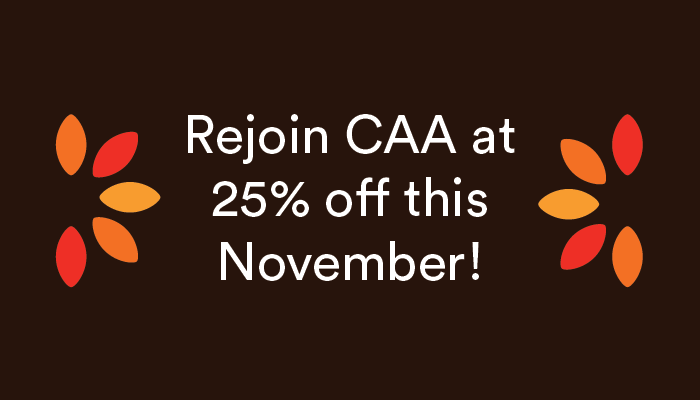
Offer valid November 1, 2019–November 30, 2019
November is the perfect time to rejoin CAA. We know your membership has lapsed, but we want you back! For the month of November, lapsed members will receive 25% off their membership.
We’re about to unveil the full schedule for the 2020 Annual Conference in Chicago, February 12-15, 2020. Registration for the Annual Conference opened October 1 and we look forward to a robust program this February. If you haven’t been to a conference recently, we’ve launched a number of new programs, including Idea Exchange and Professional Development Workshops, designed to provide professional support and networking opportunities.
New grants for funding research and travel are now available. We recently announced that we will be administering the Terra Foundation for American Art Research Travel Grants, and we just opened the application portal for the Art History Special Exhibition Travel Fund, which awards up to $10,000 to students and faculty for museum exhibition travel in connection with their studies.
CAA is growing and changing all the time, working to support the arts and humanities and all professionals in the field.
| RENEW YOUR MEMBERSHIP |
There has never been a better time to rejoin CAA!
We look forward to seeing you at the 108th CAA Annual Conference in Chicago, February 12-15, 2020.
| REGISTER NOW |
Now Accepting Applications for the Art History Fund for Travel to Special Exhibitions
posted by CAA — Oct 22, 2019
In August 2018, we announced that CAA had received a major anonymous gift to fund travel for art history faculty and their students to special exhibitions related to their classwork. After a successful inaugural year, we’re pleased to now be accepting applications for the second grant cycle of the Art History Fund for Travel to Special Exhibitions.
The fund is designed to award up to $10,000 to qualifying undergraduate and graduate art history classes to cover students’ and instructors’ costs (travel, accommodations, and admissions fees) associated with attending museum special exhibitions throughout the United States and worldwide. The purpose of the grants is to enhance students’ first-hand knowledge of original works of art.
Applications are due by January 15, 2020.
GUIDELINES
- These awards support student and instructor travel costs incurred while visiting museum special exhibitions in the United States and worldwide.
- Graduate and undergraduate art history classes are eligible to apply for funds to attend temporary museum exhibitions in the United States and other countries. Travel to see permanent collections is not eligible, nor would be performances and related ephemeral events. Exhibitions on any artist, period, or area of art history are eligible for funding.
- Awards are made directly to institutions whose institutional membership in CAA is in good standing.
- Applicant instructors must have individual membership in CAA and be in good standing.
- Funds may only be used to travel to exhibitions that correspond directly to the content of the class.
- The size of the class for which a grant may be awarded shall not be larger than fifteen (15) students.
- Awards may only be used for admission fees, travel and lodging expenses for the instructor and class members. Every attempt to attain group rates must be made.
Completed applications must include the following:
- Instructor’s curriculum vitae
- A course description and syllabus that identifies and explains the exhibition as part of the pedagogical aim of the course – Be sure to detail how the visit is integrated into the course (up to 500 words)
- An explanation of the instructor’s expertise in the subject matter of the exhibition (up to 250 words)
- A tentative itinerary of travel and lodging (up to 250 words)
- A budget detailing transportation and lodging expenses associated with traveling to and from the exhibition and lodging and admission costs, including an explanation of how any travel and accommodation funds in excess of the award will be raised
- A letter of support from the instructor’s department chair or dean
CRITERIA
- How well the exhibition fits within the pedagogical aim of the course.
- The scholarly merit of the exhibition.
- Financial need. Would the class not be able to visit the exhibition, otherwise?
AWARDS
Awards will not exceed $10,000 per class, per exhibition.
All travel must be completed between June 2020 – May 2021.
REPORTING
Awardees must submit a report of up to 1,000 words which explains in detail the benefits received and problems encountered in the course of travel to the exhibition for which support was received.
*Reports must be submitted to CAA no later than two months after the completion of travel.
ANNUAL CONFERENCE
Recipients of the award will be guaranteed a session at the subsequent CAA Annual Conference after their travel has ended. CAA will make the session available, but costs associated with attending the conference, including registration, membership, travel, and accommodation, will be the participants’ responsibility.
TIMELINE
The deadline for application materials is January 15.
Sign Up for Childcare at the 2020 Annual Conference
posted by CAA — Oct 16, 2019

Please note: Due to low enrollment, onsite childcare for the 2020 Annual Conference has been canceled. To better meet members’ childcare needs, we are now offering Childcare Grants of up to $250 per family. Learn more and apply here.
For the second year in a row, we’re pleased to partner with Kiddie Corp to offer onsite childcare at the Annual Conference.
Care will be available for ages 6 months to 12 years of age, at a rate of $12 an hour, on Thursday, February 12 and Friday, February 13, 2020, from 8 AM – 8 PM.
Kiddie Corp programs feature arts and crafts, group games, music and movement, board games, story time, dramatic play, and many more engaging activities. Kiddie Corp is in its 33rd year of providing childcare services at conferences and trade shows and has a longstanding partnership with the American Academy of Pediatrics.
Conference attendees in need of childcare during the conference should pre-register for care. A minimum number of children must register for the service by December 3rd in order to allow CAA to offer onsite childcare in the Hilton Chicago. Please note: If we do not have enough enrollment, onsite childcare will be canceled.
Sign up deadline: December 3, 2019
CWA Picks for October 2019
posted by CAA — Oct 15, 2019
CAA’s Committee on Women in the Arts selects the best in feminist art and scholarship to share with CAA members on a monthly basis. See the picks for October below.
JUDY CHICAGO: THE END: A MEDITATION ON DEATH AND EXTINCTION
National Museum of Women in the Arts
September 19, 2019 – January 20, 2020
Judy Chicago (a feminist artist renowned for the 1970s mixed media installation, The Dinner Party), takes on her own demise in this exhibition, which includes 40 works of painted porcelain and glass and two large bronze sculptures in her hallmark bold, graphic style. Other themes captured in this exhibit are the five stages of grief and species endangered by the action or inaction of humans. Chicago’s ever-present feminist content challenges the culture that prizes youth and beauty, often over the suffering of other creatures. The Price of Love (after Kollwitz) (kiln-fired glass paint on black glass, 2015) shows two figures in a tight kneeling embrace, hands covering their faces, with the script: “Grief / DESOLATION / Sorrow / LOSS” all painted with white on black, evoking the depth of sorrow. The imagery remarkably reflecting the style of Käthe Kollwitz’s prints depicting the sorrows of those left behind after World War I, notably in people tightly embracing. This tribute by Chicago to an artist who came before her exudes the layers of meanings in her work and refreshingly acknowledges the myth of the individual artist. Beyond content, her continued commitment to feminism is also echoed through her choice of media historically associated with women’s artistic endeavors, thus exposing the socially constructed ideals of high versus decorative art, as famously done in The Dinner Party.
CALL FOR WORK: UNDEFEATED: CANVAS(S)ING THE POLITICS OF VOTER SUPPRESSION
West Virginia University Libraries
Deadline: December 31, 2019
West Virginia University takes on a contentious topic on the occasion of the 100th anniversary of the ratification of the 19th amendment to the US Constitution (granting women the right to vote), and the 55th anniversary of the Voting Rights Act of 1965 (enforcing voting rights for racial minorities) by looking at the efforts to suppress the votes of women and minorities since 1920. The WVU Libraries are calling for artwork using the template of a round button design (digital or otherwise; the Library has round canvases to disperse should artists need) around the major themes: Information/Disinformation, Access/Intimidation, Legislation/Legal Questions, Voter Fraud, and Advocacy/Action. Selected works will be on display at the University’s main campus Library from August 2020 through June 2021, and selected designs from the exhibit will be made into buttons/stickers. Located in Morgantown, artists have a great opportunity to make an impact in a local hub of arts activity in an otherwise underserved region of Appalachia.
MARINA ABRAMOVIĆ
THE CLEANER
Museum of Contemporary Art, Belgrade, Serbia
September 21, 2019 – January 20, 2020
This is the first major European retrospective of Marina Abramović, a female artist renowned for her radical performances developed since 1970s. The location of the exhibition, the final on its tour (it was first shown in 2017 at the Moderna Museet (Stockholm, Sweden), and then traveled to the Louisiana Museum of Modern Art (Humlebæk, Denmark), Henie Onstad Kunstsenter (Oslo, Norway), Bundeskunsthalle (Bonn, Germany), Fondazione Palazzo Strozzi (Florence, Italy) and the Centre of Contemporary Art ‘Znaki Czasu’ (Toruń, Poland)) is significant, as Belgrade is Abramović’s place of birth. It is also where her artistic career began.
The artist has experimented with performance art and used her body as a method and a medium, relentlessly testing its boundaries and limits and challenging social and cultural stereotypes. The exhibition reviews Abramović’s over fifty-year long career, focusing on chronological phases in her artistic practice and emphasizing her solo career from 1991 until 2017. It is a rich display of over 120 works including a range of objects, photographs, paintings, drawings, video installations, films, and archival materials. There is also a live segment presented through re-performances by local and international performers.
MONA HATOUM
REMAINS TO BE SEEN
White Cube Bermondsey, London
September 12 – November 3, 2019
White Cube’s exhibition captures Mona Hatoum’s new and recent installation, sculpture and work on paper. Hatoum, a Palestinian multimedia and installation artist, throughout her career has created a rich aesthetic vocabulary that often references the grid and geometry as references to systems of social control. In the exhibition the artist reflects on surveillance systems and mobilizes issues concerned with mobility, conflict, and power. Once again working with the grid, Hatoum uses industrial materials such as steel, brick, concrete, rubble, and glass—but also human hair—and collapses them into light, a suspended cube. Her visual poetics tests spatial and spherical limits and explores possibilities for formal but perhaps also social and political collapse. The theme of the grid and its negotiation overarches the works presented at the exhibition, the new installation Remains to be Seen (2019), Orbital I (2018), A Pile of Bricks (2019), Hair Mesh (2013), or Cells (2014), among others. Hatoum tests different confinements while exploring the basic form of the globe and questions the different and multiple boundaries that are imposed on society.
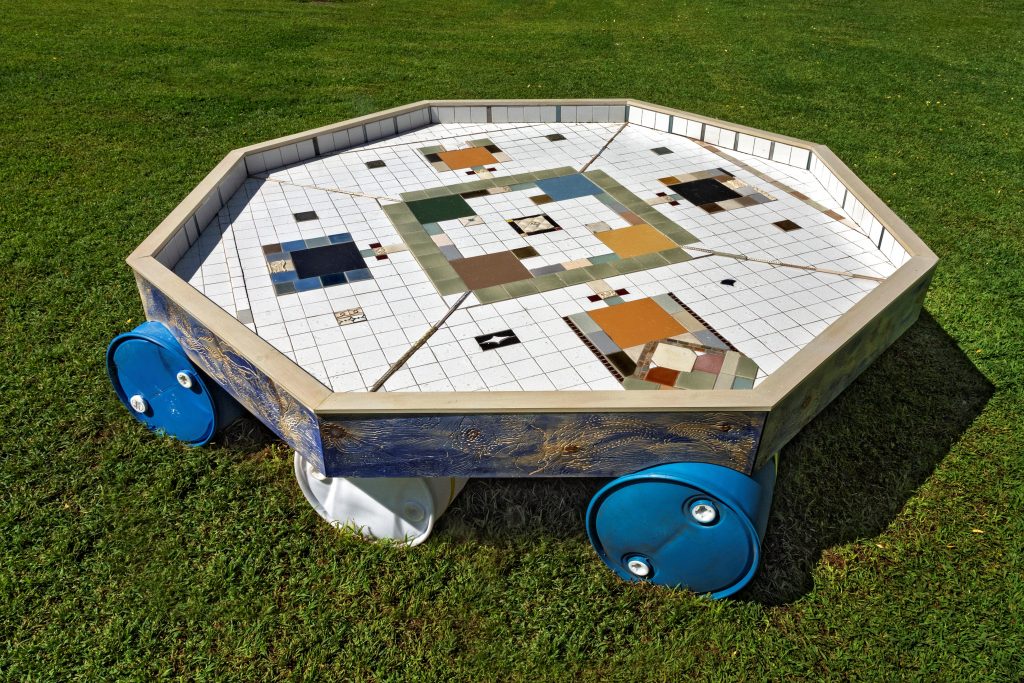
Bahar Behbahani, All water has a perfect memory. (Octagon), 2019, hard-carved pinewood panels, Lapis Lazuli pigment, mosaic, tile, plastic barrel, lashing strap, sandbag, 12 x 12 x 3 feet, Wave Hill, Bronx, NY. On view at Wave Hill through December 1st. Photo: Stefan Hagan
Bahar Behbahani, All water has a perfect memory.
Wave Hill, Bronx, New York
September 15 – December 1, 2019
Bahar Behbahani’s (b. 1973, Tehran, Iran) site-specific installation titled All water has a perfect memory. [the period is intentional] is settled somewhat precariously along the eight-acre wooded expanse at Wave Hill, the Bronx public garden and cultural center known for supporting dynamic contemporary art projects and exhibitions. The installation’s primary feature is the large presence of a land-bound raft constructed in the shape of an octagon, ornamented with inlaid mosaic and tile, and supported on plastic barrels. Behbahani’s structure fosters multiple discussions about the garden’s surrounding woodlands and ecosystems and engages in prescient ecological debates. At the same time, the artist’s centerpiece addresses the historical flux of migration and the restriction of geographical borders. The title aptly recalls a poetic line from writer Toni Morrison’s essay, “The Site of Memory”: “All water has a perfect memory and is forever trying to get back to where it was.” In her research-based practice, Behbahani heavily layers and builds upon her cultural and aesthetic references, and water plays a central biographical and performative role in her videos and paintings. Likewise, water functions as a primary visual and spiritual element in the Persian Gardens of Iran, the majestic walled paradises and civilian sanctuaries dating back to the sixth-century BC. Water was a foremost compositional cornerstone of these historic gardens that were organized on a fourfold plan around central pools or fountains from which flowed four channels. At Wave Hill, the manifestation of the octagonal pool, raft or “fountain,” accessorized with botanical panel designs, forges further connections to eight of the world’s contested rivers: the Euphrates, Ganges, Hudson, Karun, Mississippi, Rio Grande, and Wouri. Moreover, the octagon appears as both a sheltering and perilous object. As a stationary structure, it conjures the urgent political narratives on mobility and circulation that underline the fraught experiences of migrants and refugees. In the accompanying pamphlet, the artist explained these multifold references, stating that “the project made her think about the ‘complexity’ of building a ‘worthy raft,’ one that would be able to ‘move people, food, belongings as well as culture and memories to safety…” The project also questions broader horticultural concerns about what determines “native” flora and species. Additional technological components activate river sounds, a meditative element arranged by musician Maciek Schejbal. In the near future, the octagon will hopefully find a way to reach water, holding with it a bounty of new and old memories.
Registration Now Open for the 2020 CAA Annual Conference
posted by CAA — Oct 01, 2019
2020 CAA ANNUAL CONFERENCE
Hilton Chicago
FEBRUARY 12-15, 2020
Four days for everyone in the arts with over 300 sessions and panels, dozens of receptions and parties, professional development workshops, lightning talks, and exhibitors. #CAA2020
For the first time since 2014, the CAA Annual Conference returns to Chicago in February. We welcome all those in the visual arts to attend over 300 sessions and professional development workshops, as well as dozens of receptions, parties, and special tours at local museums and cultural institutions. The Book and Trade Fair, with over one hundred booths showcasing the latest products, programs, and books, will be on the lower level of the Hilton Chicago. Our partners offering free or discounted admission and special tours this year include Art Institute of Chicago, the Field Museum, the Design Museum of Chicago, and many others.
The 108th CAA Annual Conference content will address the full breadth of the field of visual arts and design and will examine a range of cultures, histories, and scholarship. We anticipate more than 5,000 professionals in the arts to attend the conference in Chicago. In collaboration with the Committee on Women in the Arts, we offer 50 percent of the conference’s content in celebration of the Centennial of Women’s Suffrage in the United States, while also acknowledging the discriminatory practices that limited voting rights for Indigenous women and women of color, even after the passage of the 19th amendment in 1920.
We are excited to announce that several renowned artists, designers, and scholars will be speaking at the conference. On Wednesday, February 12, Chicago-based visual artist Amanda Williams will be delivering the keynote address at Convocation. On Friday, February 14, our Artist Interviews will feature Sheila Pepe and Arnold J. Kemp, and this year’s Distinguished Scholar Session, held on February 13, will honor Kellie Jones.
Learn More about our Notable Speakers
Once again, CAA will offer travel grants and scholarships to individuals looking to attend the Annual Conference. With the generous support of Blick Art Materials and Routledge, Taylor & Francis, CAA will provide eight student member registrants with $250 each to attend the conference.
We look forward to seeing you in Chicago!
Please contact Member Services at membership@collegeart.org or at 212-691-1051, ext. 1 with any questions.
Affiliated Society News for September 2019
posted by CAA — Sep 11, 2019
Affiliated Society News shares the new and exciting things CAA’s affiliated organizations are working on including activities, awards, publications, conferences, and exhibitions.
Interested in becoming an Affiliated Society? Learn more here.
SECAC
The 75th Annual SECAC Conference, hosted by the University of Tennessee at Chattanooga, will be held October 16 through 19, 2019. More than 540 papers—on studio art, art history, art education, and graphic design—will be presented in 142 sessions. All sessions will take place at the Chattanoogan Hotel. Offsite events include the annual SECAC Artist’s Fellowship and Juried Exhibitions and a keynote address by artist, educator, and advocate for artists, Sharon M. Louden, who serves as editor of the Living and Sustaining a Creative Life series of books and Artistic Director of the Visual Arts at Chautauqua Institution. More information and conference registration are available at https://secacart.org/page/Chattanooga.
Society for the Study of Early Modern Women and Gender (SSEMWG)
Foundation for Advancement in Conservation
Material Immaterial: Photographs in the 21st Century Symposium and Seminars
September 23-25, 2019, Yale University, New Haven, CT
Organized by Paul Messier and Monica Bravo
We are witnessing the historic transformation of photography from tangible objects—prints, plates, and negatives—to code: intangible bits, bytes, and pixels. As the tether between visual culture and the material world is recalibrated every day, a new form of literacy is required to draw meaning from physical media and its obsolescence. At the very moment when characterization and interpretation of the printed photograph is rapidly gaining ground, the momentum toward dematerialization raises the issue of the long-term relevance and sustainability of photography as a material fact. Does the physical photograph still matter today—as a source for teaching, learning, and scholarship—and will it matter into the future?
This symposium and elective seminars will provide insight into new tools for researching photographs with an emphasis on both the material and immaterial aspects of the medium. Conservation professionals will gain practical knowledge on new and existing techniques for characterizing prints and collections and how this information can be structured and visualized. Curators and art historians will benefit from exposure to the methods and techniques that underlie the contemporary approaches to material history. Together, the presentations and discussions are meant to demystify techniques adapted from seemingly exotic fields of artificial intelligence and data science and to cover some basic techniques for understanding and interpreting the physical and chemical makeup of a photographic print.
View the program for detailed a schedule and speaker list or visit the event website to register.
Support for this program comes from The Andrew W. Mellon Foundation Fund for Collaborative Workshops in Photograph Conservation, a grant from the National Endowment for the Humanities, and the Foundation for Advancement in Conservation Endowment for Professional Development.
Association for Modern and Contemporary Art of the Arab World, Iran, and Turkey (AMCA)
“AMCA Interview with the Winner of the 2019 Rhonda A. Saad Prize for Best Paper in Modern and Contemporary Arab Art”
The 2019 Rhonda A. Saad Prize for Best Paper in Modern and Contemporary Arab Art was awarded to Lara Ayad for her paper “Homegrown Heroes: Peasant Masculinity and Nation-Building in the Paintings of Aly Kamel al-Deeb.” Dr. Ayad is an Assistant Professor of Art History at Skidmore College. She received her PhD in the History of Art and Architecture at Boston University. An interview with Dr. Ayad about her research may be found on AMCA’s website: http://amcainternational.org/interview-with-lara-ayad/
The Rhonda A. Saad Prize review committee acknowledges that Dr. Ayad’s paper is highly original. The Committee found that her paper was a scrupulously researched examination of the 1930s visual cultural context in which the artist worked in Egypt, when ethnography, social sciences, and fine arts intersected on the body of the muscular, model peasant.
Established in 2010 in honor of our dear and respected colleague and friend, The Rhonda A. Saad Prize aims to recognize and promote excellence in the field of modern and contemporary Arab art. The award is offered to a graduate student or recent post-doctoral scholar working in any discipline whose paper is judged to provide the most significant contribution to the disciplines of Art History and Middle East Studies. For more information and submission guidelines, please visit www.amcainternational.org.
Visual Resources Association
The Visual Resources Association Foundation (VRAF) strives to strengthen the visual resources field by increasing public and professional awareness of visual information management while advocating for the value of images in the teaching and learning environment. The VRAF supports a range of educational activities in multiple formats and venues, for example, instructional tools, regional workshops, online learning, and advocacy materials, to build bridges across the information management and educational communities. The Foundation’s research interests advance scholarship in the field, improve outreach to the larger community on significant issues. These include intellectual property rights, the development of best practices protocols for the dissemination of digital images, and furthering public access to visual resources information. Significant areas of focus include: image collections, technology, metadata, cataloging, visual literacy, and copyright. The VRAF’s educational and research agenda advances scholarship in the field and improves outreach to the larger community.
The VRA Foundation currently offers two types of grant opportunities:
1) Project grants, which provide up to $3,000, awarded to organizations or institutions for programs and projects in the VRAF Grant Areas of Interest. The funds may be used for small, stand-alone projects, pilots or start-up financing for larger projects, or for a component of a larger project. This year’s project grant was awarded to Arden Kirkland, Adjunct Professor at the School of Information Studies at Syracuse University in New York to develop the CostumeCore Toolkit for streamlining the process of developing standards-based, interoperable metadata for collections related to the study of historic clothing.
2) Professional development grants, two awards of a $1,000, are provided to an individual for professional development in the field of visual resources and image management. These grants support attendance at an educational event of the grantee’s choosing (such as, an association conference, symposium or workshop), or enrollment in relevant research activities in the VRAF Grant Areas of Interest.
This Fall, the VRAF is accepting applications for the VRAF Professional Development Grant program (see number 2 above). For consideration, please submit your application by Friday, September 20, 2019, 11:59PM Pacific Time using this online application: https://forms.gle/LHeYeRJFnEniJHJP9. If you have any questions about the VRAF Professional Development Grant or the application process, please contact the VRAF Board of Directors at vrafoundation@gmail.com. The recipient of the Fall 2019 VRAF Professional Development grant will be announced by Friday, October 4, 2019, and must be used before October 4, 2020.
This news is being provided by Maureen Burns, VRA CAA Affiliate Representative, on behalf of the VRAF Board of Directors and Visual Resources Association. For more information, please use the following contacts or social media and view the online links:
maburns@uci.edu
vrafoundation@gmail.com
https://vrafoundation.com
https://twitter.com/vrafoundation
https://www.facebook.com/visrafoundation/
Pacific Arts Association
The annual PAA Europe Conference 2019 entitled “Challenging Times – Provenances in Museums” will take place at the Museum der Kulturen Basel, from 19th to 21st September 2019. The meeting coincides with the exhibition “Thirst for Knowledge meets Collecting Mania.” Papers and reports will respond to the exhibition’s theme, “Museums face challenging times: what seemed a must for an ethnographic museum in the past – such as a collection of skulls – is now a sensitive issue. In collecting, objects were removed from their original contexts, items made of rare and precious materials such as ivory or gold aroused desires, and exotic weapons were acquired by the score. The exhibition explores the motives for this former collecting mania and poses questions as to the appropriate handling of sensitive objects today.” For further information visit https://pacificarts.org
QUEER CAUCUS
National Committee for the History of Art (NCHA)
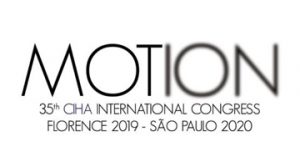
5th CIHA World congress in São Paulo – CALL FOR PAPERS
The CIHA Brazil Committee invites proposals for participation in nine Sessions, six Emerging Scholars Seminars, and a Special Session that will constitute the 35th CIHA World Congress – Motion: Migrations.
The Sessions, Emerging Scholars Seminars, and Special Session are detailed here: https://drive.google.com/file/d/1Qxyun9-gUje83bhCOGtt_d6p8EEMPmFF/view
New Media Caucus (NMC)
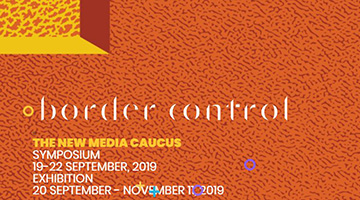 Border Control Symposium and Exhibition
Border Control Symposium and Exhibition
The New Media Caucus (NMC) is proud to present the 2019 Symposium and Exhibition, Border Control at the University of Michigan, Penny W. Stamps School of Art and Design and the Stamps Gallery. The symposium will take place on 19th – 22nd September, 2019, and the exhibition is from 20th September – 11th November, 2019. Keynote Speaker, Vinay Gupta will present a lecture, “Cities that will Walk Away” on 19th September at 5:10pm For more information about the events please visit our website: http://bordercontrol.newmediacaucus.org/
Design Incubation
Colloquium 6.1: Quinnipiac University
Design Incubation Colloquium 6.1 (#DI2019oct) will be held at the School of Communications at Quinnipiac University on Saturday, October 5, 2019.
https://designincubation.com/publications/colloquium/colloquium-6-1-quinnipiac-university/
Practicing Type in the Age of Screens
Saturday, November 9, 2019. 2-5pm. Type Directors Club, NYC
Typeface design and the implementation of typography has never been more exciting. In many cases, type is presented on monitors, tiny and huge electronic visual displays, i.e., screens. In collaboration with the Type Directors Club, Design Incubation will moderate a panel discussion among design innovators about their design and use of type in today’s changing environment. Panelists include Jason Pamental, Javier Mavromantes, Nancy Campbell.
CFP: The Fellowship Program at Design Incubation 2020
Call for Participation: 3-day academic design research and writing workshop in New York City. June 4-6, 2020. Application deadline, October 15, 2019.
Target Audience: Design academics in one or more of the following areas: graphic design, information design, branding, marketing, advertising, typography, web, interaction, film and video, animation, illustration, game design. Full-time tenure track or tenured faculty are given preference but any academic may apply.
https://designincubation.com/call-for-submissions/cfp-the-fellowship-program-at-design-incubation-2020/
CFP: The Design Incubation Residency at Haddon Avenue Writing Institute 2019
Rolling acceptances until Sept 30, 2019. Only 14 seats are available for this event. This 3-day residency allows researchers and scholars time to work on existing writing projects or to start a new writing project. The residency is open to design faculty and to those working in related fields.
https://designincubation.com/design-events/the-design-incubation-residency-at-haddon-avenue-writing-institute-2019/
CFP: A Day of Writing
Come spend an uninterrupted day working on a writing project.
Quinnipiac University School of Communications, October 6th 2019.
https://designincubation.com/design-events/a-day-of-writing/
CFP: Colloquium 6.3: Fordham University
Call for design research abstracts. Deadline: Saturday, December 28, 2019.
https://designincubation.com/call-for-submissions/colloquium-6-3-fordham-university-call-for-submissions/
Association of Art Museum Curators (AAMC)
Apply for AAMC Foundation’s 2020 Engagement Program for International Curators
The AAMC Foundation Engagement Program for International Curators is seeking eligible international and US-based curators interested in pursuing a year-long partnership dedicated to professional development and exchange.
At the core of this Program is a 12-month partnership between a non-US based curator (International Awardee) and a US-based curator (US Liaison) dedicated to reflecting on and developing self-identified areas of advancement with each other. Made possible by major support from the Terra Foundation for American Art, the Program includes travel funding for International Awardees, a participant stipend for US Liaisons, networking, and more, which are outlined in greater detail in the online application, available here: bit.ly/AAMCApply. Two pairings will be awarded.
Eligible applicants must be art curators working on or having worked within exhibitions and projects that explore historical art of the United States (c. 1500-1980), including painting; sculpture; works on paper, such as prints, drawing and photography; decorative arts; performance; and design (except industrial). Architecture and commercial film are excluded. Native American art is eligible for consideration. Additional requirements include a minimum of 50% of the time for/with non-profit organizations will be considered. Please note that curators working in four-wall collecting and non-collecting, community based, and non-four wall organizations, at any location in the globe are eligible.
Through fostering international relationships between curators, AAMC Foundation aims to not only provide opportunities for professional development and exchange, but also strengthen the international curatorial community and increase awareness of the concerns and needs of curators working outside the US. Visit our website to learn more: www.artcurators.org/page/GrantsTerra.
The online application for International Awardees and US Liaisons opens on Wednesday, September 11, 2019, and are due by 12pm ET on Thursday, October 24, 2019.
—
AAMC Foundation Webinar on Utilizing Community Advisory Groups
Join us on Tuesday, September 24, 2019 from 2:00 – 3:15PM ET to learn about the formation, implementation, and utilization of community partners and advisory groups from a dynamic speaker lineup.
From grassroots organizations to large, landmark institutions, museum teams are increasingly engaging with community members to bring history to bear on the narratives told and to bring forward the value of local knowledge. These consultations help develop and shape exhibition themes and checklists, open conversations on collecting practices and directions, and ensure that museum-generated programs accurately and genuinely reflect and engage their communities. From local focus groups to international convenings, the collaborative aspect welcomes perspectives outside the curatorial department.
This webinar explores a diverse range of current approaches, case studies, and lessons learned—from emerging grassroots efforts to established museum outreach. Speakers will address the value in engaging communities, best practices in developing partnerships and advisory groups, and ways to create meaningful and ongoing valued relationships.
Speakers include René Paul Barilleaux, McNay Art Museum; Adrian Locke, Royal Academy of Arts; Regan Pro, Seattle Art Museum; David Serkoak, Key Collaborator with the Canadian Museum for Human Rights; and Ben Tremillo, San Anto Cultural Arts.
There are only a limited amount of spots available. Registration is required: www.artcurators.org/event/communityadvisory
SHERA
The SHERA Board is pleased to announce that the SHERA Graduate Student / Independent Scholar Travel Grant for the 2019 ASEEES meeting has been awarded to Dr. Yulia Karpova (Central European University). Her paper, “Late Soviet studio ceramics as a site of institutional critique” will be presented during the SHERA-sponsored panel “Culture as Matter.”
News from the Art and Academic Worlds
posted by CAA — Aug 21, 2019
Want articles like these in your inbox? Sign up:
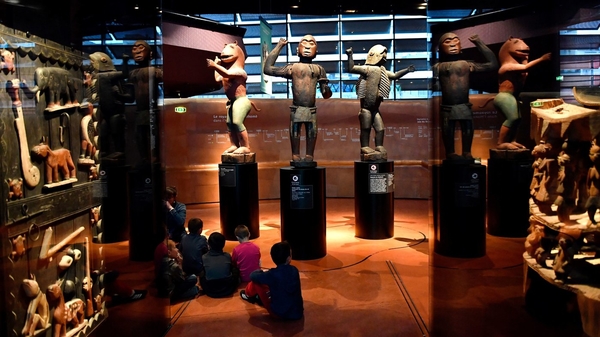
Statues from the Kingdom of Dahomey, in present-day Benin, are pictured in 2018 at the Quai Branly Museum in Paris. Photo: Gerard Julien/AFP/Getty Images
Across Europe, Museums Rethink What To Do With Their African Art Collections
According to commonly cited figures from a 2007 UNESCO forum, 90% to 95% of sub-Saharan cultural artifacts are housed outside Africa. (NPR)
San Francisco School Board Reverses Course, Decides to Save Controversial Mural
Facing international outcry, the San Francisco school board reversed course last week, voting to obscure murals by Victor Arnautoff rather than paint over them. (San Francisco Chronicle)
National Endowment for the Humanities Announces New Grants
The NEH announced $29 million in awards for 215 humanities projects across the country.(New York Times)
Princeton Art Museum Partners with Historically Black Colleges in Art Leadership Program
A new partnership aims to open up career paths for students underrepresented in the field of cultural heritage. (Princeton News)
Decolonizing Your Syllabus? You Might Have Missed Some Steps
“Inviting voices into spaces not built for them or that undermine their messages, lived experiences, and expertise can often work against the well-intentioned goals of inclusion.”(Twitter thread)



